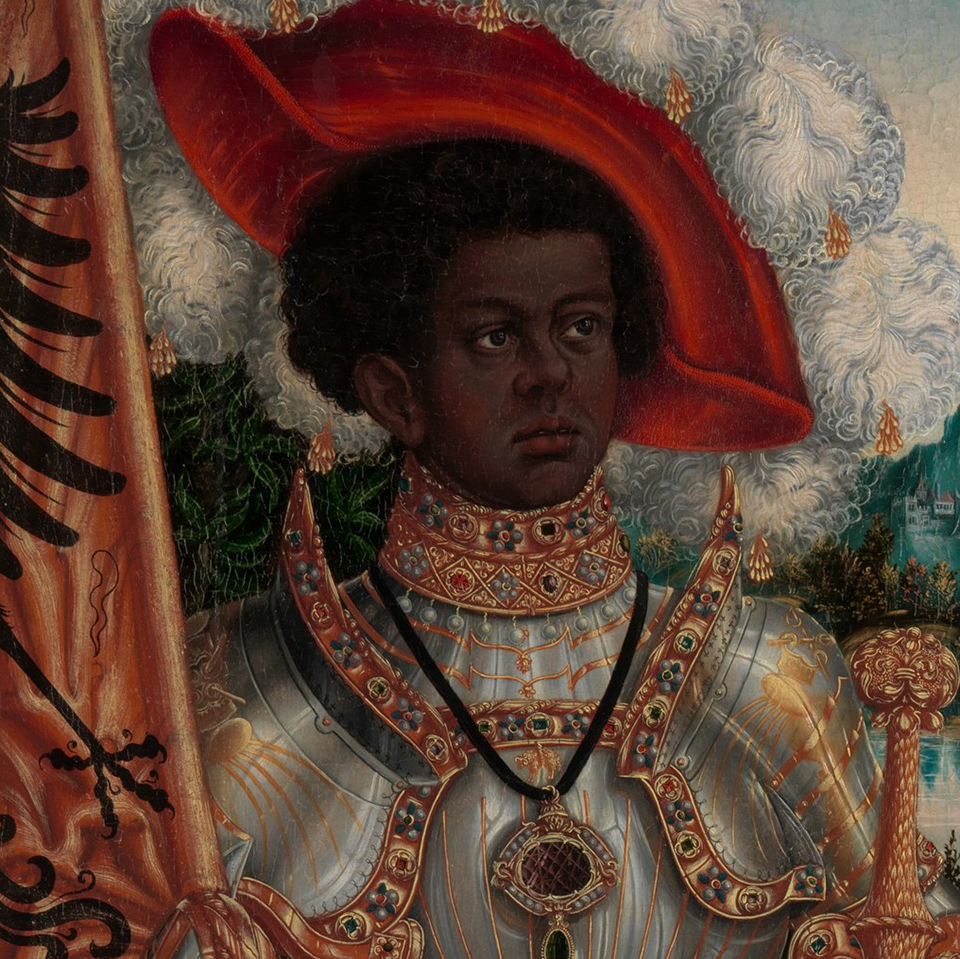It is no secret that both the film Raiders of the Lost Ark and the video game Spear of Destiny were derived from the same source. The film mesmerized a generation and was the forerunner of the action extravaganzas that still pack them in at the cineplex, while the video game was the mother of all 3D shoot-’em-up fantasies that are today even more addictive to the male adolescent than drugs. What still remains a secret, however, is the fact that what sparked the technological breakthroughs in cinematic special effects and computer wizardry was the long-venerated attribute of a black saint.
During pagan Rome’s occupation of Switzerland in the third century, Maurice, a centurion from the upper reaches of the Nile, along with an entire legion comprising 6,666 of his African countrymen, had chosen death rather than participating in the persecutions that had been ordered by the emperor, Maximian. With so large a number winning the martyr’s palm together, the Theban Legion fired the imagination of the early Christians. The mystical dimension of their number is what undoubtedly made them so ideal a metaphor for the Church Militant.
With the elevation of their cult to national status in the tenth century, the spear of St. Maurice became the scepter of the Holy Roman Emperors. Just how important a place this exemplary communal act of self-sacrifice was accorded in the hagiography of the early Church can be gathered from the age-old tradition that St. Maurice’s spear was one of the most sacred relics in all Christendom: the spear with which Longinus pierced our Savior’s side on Calvary. The scholarly consensus is that the reassignment of the lance from St. Longinus to St. Maurice was initiated during the reign of Charlemagne.
Because of the large number of both Sudanese and Senegalese troops in the Islamic armies of the eleventh, twelfth, and thirteenth centuries, it is not difficult to understand why the figure of St. Maurice would become such a dominant one during the Crusades. The myth of Prester John, the Christian priest and king who ruled a land of milk and honey in Ethiopia and who therefore posed a threat to the rear flank of Islamic military power, can be traced to this black soldier-saint too. Prester John’s cult became the basis from which the age of chivalry sprang. To it can also be attributed the source for the various black heroes and heroines of the great medieval romances, especially the Grail cycle—the objective of which was to translate into a more secular idiom the imperial aspirations for Christian universality. In our own time, Pope Benedict XVI, in attempting to explain the significance of the Caput Ethiopicum on his papal coat of arms (“the Moor of Freising,” which also can be traced back to Prester John), pointed out that the heraldic figure was a representation of all humanity.
Tragically, there is, of course, an all-too-obvious a reason why this saint is still virtually unknown today: the involvement of most European nations in the slave trade, which would not have tolerated, much less encouraged, the devotion to a black African who had once been nothing less than the personification of the military might and religious ambitions of what was once the greatest world power in Western history.
This long-forgotten story of St. Maurice—which was once such a spiritually influential and politically powerful ideal of black manhood—offers the Church an evangelical opportunity of such magnitude that I would find it absolutely impossible not to see in it an unequivocal example of divine providence. Doesn’t all the deeply insightful and magisterial analysis the media generated over the Black Panther phenomenon provide enough of an argument as to why this black saint could prove infinitely more important? The recent loss of Chadwick Boseman, who played the lead in the film, also underscores the importance of rediscovering St. Maurice. The story of Boseman’s generosity to young urban males drawn to the image of T’Challa—while silently battling the cancer he finally succumbed to—is a story that has inspired many and reflects something of the heroic virtue of St. Maurice, as well as such modern African examples as St. Charles Lwanga and his fellow Ugandan martyrs.
From an American perspective, one of the most powerful tributes to St. Maurice was penned by none other than Rev. Theodore Parker in 1850. Parker was the proper Bostonian and Unitarian reformer whose sermons served as an inspiration to both Abraham Lincoln and Rev. Martin Luther King. The context in which it was delivered—on September 22, the black saint’s feast day—was the Fugitive Slave Act. Passed by Congress only four days earlier, it ruled that slaves who had escaped to the North should be returned forthwith. Furthermore, whites who assisted or supported the runaways would be prosecuted to the full extent of the law. Parker delivered a blistering excoriation of anyone who would comply with the injustice of this federal dictate, using “the Catholic story” of the black legionnaire and his famous defiance of the Emperor Maximian as his own rallying cry.
Given all that St. Maurice once represented, in today’s context he can still provide not only the black Catholic population but the world’s black population the same kind of socio-political empowerment many in the West feared he could have exercised during the height of the Atlantic slave trade. Indeed, St. Maurice has been accorded such an important place in military history that, in 1995, the National Infantry Association, in conjunction with the Chief of Infantry of the United States Army, instituted the military Order of St. Maurice. Approval for the medal had been granted to the NIA by the military ordinariate office of Francis Cardinal Spellman four decades earlier.
Because of Protestant denominations’ unfamiliarity and discomfort with our hagiographical traditions and sensibilities, I’ve long believed that the reintroduction and the popularizing of this black saint is a uniquely Roman Catholic obligation and one that grows ever more desperate and increasingly urgent.
Sancte Mauriti, ora pro nobis!
